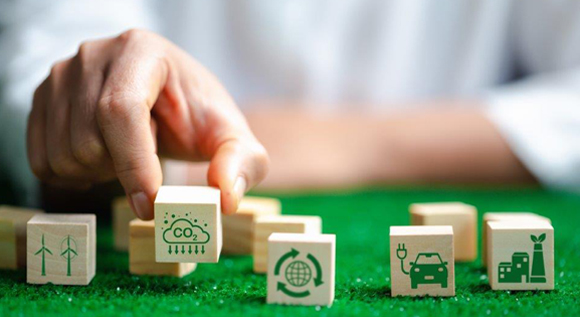Renewing prosperity in a climate-neutral manner
Germany is restructuring its energy supply to be climate neutral by 2045. A working report presented in mid-March summarises the targets, current state of affairs and next steps in the energy transition.
 © Adobe Stock/ doidam10
© Adobe Stock/ doidam10
To achieve this, we need to reform our energy supply and industrial value creation in companies. The socio-ecological realignment of our model of prosperity must also focus on participation, strengthening our common infrastructure and sharing the costs of the necessary change.
The steps to renewing the energy system
The key elements of an onshore wind energy strategy are to be presented at a wind summit on 22 March. They include improved financing conditions for turbines beyond the RES Act and proposals addressing how more land can be made available in the short term. Municipalities are to receive more support in the planning and realisation of wind energy projects.
At the first photovoltaics summit in mid-March, the Federal Ministry for Economic Affairs and Climate Action, the Länder and associations discussed accelerating the expansion of photovoltaic installations (PV) in Germany. A “power plant strategy” on the need for expansion and modernisation among power plants is to be drawn up by the summer. Power plants are to be repurposed for the future use of hydrogen. From 2024, newly installed heating systems are to be powered by at least 65% renewable energy. There will be exceptions to this rule, as well as transitional solutions and periods, and social subsidies.
A heat planning act is to drive the future expansion of the heat network. The act will anchor municipal heat planning nationwide and create a central coordinating instrument for local, efficient heat and strategic planning and investment decisions at local level. An acceleration act and an import strategy for hydrogen are planned for 2023 to advance the ramp-up of hydrogen production and the construction of the infrastructure required for this.
How the renewal of industrial value creation is to progress
An industrial strategy is to strengthen the competitiveness of industry, thus renewing prosperity and participation therein on a climate neutral basis. Carbon contracts for difference are a key instrument in the decarbonisation of industry. They are to be used to fund additional costs that arise when companies shift their conventional industrial facilities to climate-friendly energy production. The Federal Ministry for Economic Affairs and Climate Action is also developing a tiered industrial electricity price model. This will make more low-cost electricity from renewable sources available to industry.
Factors for progress in the transition
For the transition to succeed, basic conditions must be met: infrastructure and investment projects must be planned and approved quickly, and production capacities and raw materials are needed for wind turbines, PV modules and heat pumps. Further cornerstones include a ensuring a sufficient number of skilled workers and mobilising capital to finance private and public sector investments.

